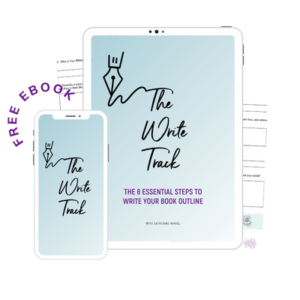You may have a great idea or a compelling personal story or feel that it’s time to expand beyond the reach of your blog or podcast. And you’re wondering how to start writing a book.
If you want to turn your idea from a concept into a book, it will take dedication, hard work, and a lot of writing to complete your draft.
Whether you are just at the beginning of your writing career or are looking for some writing tips to refresh your inspirational tool belt, this article will provide you with everything you need to begin writing, develop a more consistent writing practice, and finally be on your way to getting that book written. After all, you deserve to share your story. And there are lives out there who will be inspired by your vulnerability to do so.
Let’s dive in.
How to Start Writing a Book
Step 1: Find Your Inspiration
Great writing starts with being inspired.
Whether it’s a movie you saw, a book you read, or a song you heard on the radio, a great idea can start small and grow into something much more than you imagined.
Here are some ways you can get inspired and excited to start writing.
Find ways to get into a creative zone.
If you’ve already experienced writer’s block, you know how frustrating it can be.
It happens to many writers – you sit down to write and feel like all your thoughts have been replaced with a blank page, or your mind wanders to ideas related to anything except what you have sat down to write about.
I’ve been there many times…
Reactivating your creative zone is one of the best ways to get yourself writing again.
There are plenty of tricks you can use to boost your creative thinking. Here are some of my favourites:
- Do something you love and enjoy that is unrelated to your writing project (e.g., painting, listening to music, baking)
- Talk to a friend (I have two people in my life I always reach out to when I want to bounce a few ideas, vent or need some laughs. Find those people. And occasionally, I leave the conversation with a disclaimer along the lines of this may end up in a story near you — all in good fun)
- Explore a new part of the city in which you live.
- Read a book (whether you fancy fiction or non-fiction, often reading others’ words can help you gain a new perspective, idea, critique or feeling — leverage those!)
- Browse the latest covers at your local bookstore (*this is my go-to often. Seeing other published pieces, from the titles to the colours to the names of the aisles, I always find something that triggers all the right words. I always travel note-ready. The last thing you want to do is feel inspired and then lose that greatness when you sit back down to write. I have found this practice especially useful for my work and clients.)
- Have a meal at a new restaurant and delight your senses in the foreign flavours and aromas. (I’m a self-proclaimed foodie, so this one excites me! Additionally, since I rarely dine alone, this type of experience pairs perfectly with the right company)
- Sit in a coffee shop and observe what is happening around you (people-watching can also help stimulate emotions you wouldn’t experience otherwise. Think about their mannerisms, expressions, behaviours and even their conversations. People-watching has given me immense perspective, mainly when I am writing narrative pieces – details matter)
- Start a dream journal.
After your experience, go back to writing and see if the ideas you started writing flow differently.
Make a list of all the different ways you can get into YOUR creative zone, and when you experience writer’s block, go to your list to get unstuck. The ugly truth is that you will experience writer’s block. It’s basically a given. However, you don’t need to let it overwhelm or annoy you; just be prepared to deal with it. It happens to the BEST of us.
Document Everything
Ideas often come to us naturally when we least expect them.
So, document everything! This is key to start writing your book.
Get into the habit of carrying a small notebook or a pad of sticky notes with you, saving some notes on your phone, or (my favourite) recording voice notes.
You never know when these ideas and sparks of inspiration will come in handy for your book or next written piece.
An example I can share which has always struck people as the most outrageous was back in 2019; I was in Costa Rica celebrating a friend’s birthday.
Since she had decided to scare the heck out of us ziplining over the rainforest, I repaid the favour with a river tour where I left out the part about the rapids we would also encounter. We’re on this little dingy of a boat; our guide was awesome. He had zero teeth and spoke not a word of English — but he was still awesome.
And then came the crocodile (I wasn’t ready for this) but then growing ultimately sideways out of the bank was a tree.
A thriving tree, I should add. This lit me up inside, and immediately despite seeing our crocodile friend moments earlier, I whipped out my phone and made a note about this tree. My message read, ‘sideways tree in the river, Costa Rica.’ I was wondering at the time how I would use this note, but I can tell you that months later, it was the perfect analogy for a piece of mindset content I was working on. Creativity, perseverance, resilience — this tree covered all the topics in the most descriptive and powerful ways I needed.
You never know where your experiences will benefit your writing. So please, document them all!
Read as Much as Possible
Just like speaking begins with listening, writing starts with reading.
Reading allows you to enrich your vocabulary, explore different perspectives, see how books can be organized and presented differently, and become aware of other voices.
This is instrumental as you develop your voice and unique writing style and ultimately plan and write your work.
If you need to know where you begin, read a bit of everything to get inspired (from fiction novels to short stories to memoirs) and see what writing styles and genres resonate most with you.
Reading a dozen (++++) books about a particular genre would be best before writing a book in that style. However, reading a few dozen books before writing can be overwhelming, so let me qualify that slightly.
Write when you feel inspired, write when the ideas are flowing, write a timeline of events, and write about your characters or environments. The finessing of your written piece will come from the experience and perspectives you will gain from reading my suggested dozen (ideally more) books.
When I decided to focus on ghostwriting a majority of biographies and memoirs and working only with non-fiction book coaching clients, I consumed (and still do) dozens of books in this genre.
The top three for me in this category are;
- Finding Me by Viola Davis
- Untamed by Glennon Doyle
- Greenlights by Matthew McConaughey
An honourable mention to The Meaning of Mariah Carey by (you guessed it) Mariah Carey. And what was most interesting about this mention is I didn’t love Mariah Carey as a singer. Sure, there will always be some bangers, but I can’t say I was one of her lambs (what she calls her fans).
However, after finishing her book, I found an entirely new appreciation for her. And shortly before Christmas 2022, my long-time friend surprised me by joining her at the Mariah Carey concert!
Her book and her vulnerability in sharing her story opened my eyes, and I absolutely LOVED her concert. It’s incredible what sharing your story can do for people, right?
Step 2: Develop a Consistent Writing Practice
Write everyday
Writing daily is one of the best habits you can develop as a writer.
The goal here is not to produce a written masterpiece each time you sit down to write but to exercise your ability to put your thoughts onto paper; this will come in handy for your future writing endeavours, trust me. Great writers write all the time.
You can write about your day, something that inspired you, or find writing prompts that resonate with you.
Even if you write a page daily, it will transform how you show up as a writer’s life and help you overcome any self-doubt holding you back.
Writing one page daily can help you create bite-sized, manageable pieces of your book and support the process to feel less overwhelming. Think about it: one page a day could make a 365+ page book in a year. This is a win when it comes to how to start writing.
When I work with my book coaching clients, we create a finished manuscript in 120 days. Working with a professional can shorten the learning curve (and process). This could be something to consider (for a variety of reasons).
Step 3: Create your ideal writing environment
There is a reason for the cliche of writers tucked away in log cabins in the serenity of nature (think the Secret Window with Johnny Depp).
Can you pause here and picture your ideal writing environment? What does it look like? What makes it ideal?
To write a book, you need a calm and inspirational environment that allows you to stay focused on your writing (i.e., minimal distractions).
Before you search for an AirBnB and book time off work, know it is possible to create this environment in your home or local area!
Writing at Home
If you can have a quiet, dedicated writing space free from distractions in your home, go for it!
Decorate the space in a way that inspires you (with your favourite books, quotes and posters). Create the habit of letting this be the space you go to write.
Let other people in your house know when it’s writing time, potentially hanging a “Do Not Disturb” or “Writing in Progress” sign on the door to let them know when you are hard at work.
Find a coffee shop or co-working space.
No big deal if your home is too busy or you can’t find a space that lights your creative fire.
Let this be an opportunity to explore local coffee shops or co-working spaces. This can be a great way to get out of the house, change up your environment when you write, and find new sources of inspiration. You may also meet some interesting people along the way.
I am a massive fan of coffee shops and co-working spaces; however, having a designated workstation in my home is beneficial.
It’s a place in my house where my son (who lives with me) knows I am not to be bothered when I’m working at my desk. As someone who lives in Toronto, Canada, where the weather can play a factor in getting out of the house more often, the workstation was a must to stay consistent on each writing project.
Step 4: Choose your writing tools
Firstly, you’ll have to decide whether to write by hand or by computer.
This, of course, depends on whether you are just starting to develop your writing habits or further along and in the process of writing your book/manuscript.
If writing by hand…
Find a journal or notebook you want to write in; make your writing time a memorable experience. You can even pick a pen or other writing utensil that you use just for your writing projects. Some writers write entire books by hand. If this is your jam, go for it but know that most manuscripts are easier to share with editors and get ready for publishing when they are already in an electronic format.
You may need to hop onto a computer.
If writing on the computer…
You’ll want to decide what writing software you’d like to use.
Do programs like MS word or Google Docs satisfy your needs? This is usually enough for most people, especially to start your writing journey.
Or do you need something with more features like Evernote, Scriniver, Notion, or Dabble?
Research the various platforms and note the available features to support your writing.
I also recommend the following:
- Using a writing assistant, such as Grammarly, to monitor your grammar and spelling as you write (there is a free version available)
- A notepad or voice recording app on your phone (if you don’t already have these) to help you document those spur-of-the-moment ideas that I touched on earlier.
Step 5: Establish/Refine Your Book Idea
Once you write more consistently, you will be in a great position to start your book.
A great book starts with a great idea.
You will need to get super clear on the vision for your book, which involves three essential elements:
- What do you want to write about
- Why you are writing your book
- Who is your audience, and how will your book impact their lives
These three elements combine to form what I like to call your North Star, which ideally can be distilled into one sentence. This will guide your writing process and keep you on track!
Step 6: Create an Outline of your Book
If you enjoy clarity, structure and organization – or even if you don’t – a book outline will be your best friend if you want to how to start writing a book. Trust me, and it’s well worth spending time outlining.
A book outline will:
- help you filter and organize your ideas
- keep you on track with your writing process
- create a cohesive story
- allow you to write meaningful content
- enables you to see the bigger picture
Lucky for you, I wrote an entire post on how to write a book outline, where I share some tips and tricks to help you take your vision and turn it into a roadmap.
Step 7: Get Clear on Your Writing Goals
Like any other project, one of the best ways to establish a consistent writing practice is to set goals for yourself. For example, your writing goals may include the following:
- The amount of time you will write each day/week
- The number of words you will write each day/week
- Deadlines for your written work (this could be a short timeline for a blog post and a bit longer for a book or manuscript)
It is best to set SMART goals; those that are Specific, Measurable, Achievable, Relevant, and Time-Bound. Then, write them down and place them somewhere you will see them every day (e.g., bathroom mirror, by your bedside, your phone background).
For example, I aim to write for x minutes every day/week.
Check in to see how you are doing with your goals periodically. You can constantly adjust as needed if you have more/less time to write than anticipated.
Step 8: Develop a Writing Schedule
If you are writing a book, you must establish a schedule so that your daily/weekly writing goals and milestones align with your timeline for finishing the first draft.
Consider when you want your book to be finished, along with the number of chapters and words that need to be written. Again, your outline (see Step #6) will be helpful for this part.
Remember to be realistic and schedule breaks (exercise, food and social time) as needed!
Find time management techniques that work for you. For example, the Pomodoro technique (25-minute focus periods followed by 5-minute breaks) is a great way to keep yourself focused.
Step 9: Start Writing & Lean in for Support
Yes, there is much to plan when writing a book, but there is also a lot to write. So, at some point in everyday life, you need to trust that you are ready and start writing!
However, there is no need to be overwhelmed or go through the process alone.
If you want further guidance on how to start writing a book or a seasoned set of eyes to help you refine some of your existing story ideas, or drafts, you may benefit from working with a book writing coach.
A book coach can support you at all stages of your writing journey and answer your many questions.
Check out my Guide to Working with a Book Writing Coach for all the information you need – from what a book coach does to how to find the right person to support you.
I’ve ghostwritten 15 non-fiction books and counting, and have worked with many book coaching clients on their books — and I would love to support you on your book-writing journey; it doesn’t have to be daunting.
Whether you are just starting to learn how to start writing your first book or are on your way and experiencing some roadblocks, I’m confident I can help you share your story.
Book a coffee chat with me, and let’s get that book written!
Use your voice, and make an impact.
Catherine x

Email: catherine@catherinenikkel.com
Resources
What type of Content Creator are you? Take the Quiz! – 4 different types of creators, which one are you?
Need help telling your story in your own voice? Let’s make it happen. Schedule a consultation with me here





